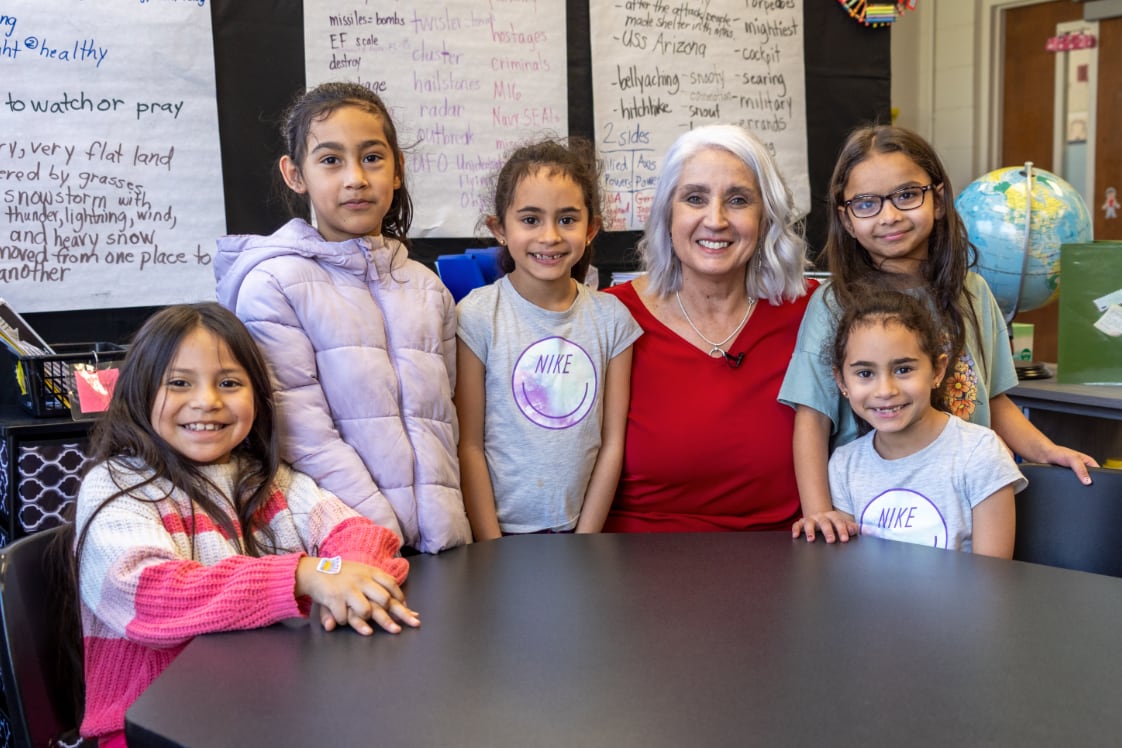Sign up for Chalkbeat Tennessee’s free daily newsletter to keep up with statewide education policy and Memphis-Shelby County Schools.
The Tennessee educator chosen as the nation’s teacher of the year is calling on America’s 3.5 million teachers to “find their voice” on behalf of students as many states seek to censor teachers, ban books, and push voucher policies that send taxpayer funding to private schools.
Missy Testerman, who just ended her tenure as Tennessee’s teacher of the year, said that bigger educational priorities demand attention: air conditioners are breaking down in aging school buildings as a new academic year begins; federal pandemic relief funding is running out to pay for tutoring and summer learning programs; and school communities are struggling to provide mental health support, especially for their most marginalized students.
“When we find our voices, we find our own way to stand in the gap for kids. It is not enough to just shut our classroom doors and teach,” Testerman said in her video address to the nation, released this month by the Council of Chief State School Officers.
Testerman, who officially began as her profession’s top ambassador in July, is on leave this academic year from her job at Rogersville City School, where she teaches English language learners in her rural Appalachian town of 4,500 people. Her new role includes traveling to more than 150 speaking engagements or appearances before organizations spanning education, business, health, and government.
Among her messages: Teachers are experts in their field.
“Your governor is not an education expert. The legislature is not filled with education experts,” she told Chalkbeat. “If you want an expert on education policy and outcomes and what works for students, ask your teachers, your administrators, your director of schools.”
That message has resonated at her talks, where she’s routinely greeted afterward by a line of educators waiting to thank her.
“It’s hard to do a profession where you are the expert, but you’re often not treated as such,” she said. “Sometimes, we need to be reminded.”
Testerman spoke with Chalkbeat on Friday before ceding her title as Tennessee’s teacher of the year to the 2024-25 honoree, Bryan Kerns, a math and fire management instructor at Dobyns-Bennett High School in Kingsport.
In many ways, Testerman said, Tennessee epitomizes the challenges faced by educators she’s met across the nation, many of whom feel like they’re walking on eggshells just to keep demanding jobs that pay a modest salary.
While she applauded a focus on early literacy and significant investments in vocational and technical education under Gov. Bill Lee’s administration, she said other policy changes during the last six years have been more of a burden.
A 2021 state law limits what public school teachers can say about race, gender, and bias in the classroom and interferes with instruction on difficult but important topics included in the state’s academic standards. A group of Tennessee teachers is challenging that law in federal court.
Tennessee’s 2022 school library law, billed as a way to ensure materials are age-appropriate, quickly expanded so that a state panel can ban certain books statewide, based on local complaints. This year, lawmakers added a definition of “suitable” that makes it easier to remove materials, including many stories about Black people or those identifying as LGBTQ.
Also this year, the legislature passed a law requiring public school employees to out transgender students to their parents and debated a bill designed to ban LGBTQ+ flags in schools. Testerman called the second proposal, which failed to pass, a distraction.
“From my standpoint, there are so many problems facing schools — I’ll give you a list,” she said. “But that’s not one that I think we need to waste a lot of time on. Let that be a local decision.”
Meanwhile, Lee’s administration is pushing for a statewide voucher program that would let any Tennessee family use taxpayer money toward private school tuition, regardless of their family income.
“Tennessee is currently in the bottom tier of states in per-pupil funding for public education, and increasing that should be our focus,” said Testerman.
“Right now, however, there’s a $144 million placeholder in our state budget for a voucher program that didn’t even pass,” she continued. “It’s disheartening for teachers to know this money is sitting there doing nothing while their students have so many needs.”
Testerman said the money could be used instead to fix broken air conditioners in Memphis schools, hire more mental health professionals in her own school system, and replace outdated Chromebook laptops in suburban Williamson County near Nashville, one of the state’s most affluent districts.
“If Williamson County is seeing these kinds of financial problems,” she said, “you can imagine what’s happening in urban and rural districts in East and West Tennessee that don’t have the tax base to raise funds the traditional way.”
While it often feels like her profession is under attack, Testerman said she’s inspired by the educators she’s met across America as she advocates for higher compensation and respect for them.
“This job can feel heavy,” she said. “Teachers are facing student behavioral and mental health issues at a scale they’ve never seen before. We have no idea what kids go home to. But we can make the seven hours that they’re with us happy. We can use those hours to deliver academic content in a way that prepares them to move on and hopefully create a good life.”
“We are hope givers,” she said.
Marta Aldrich is a senior correspondent and covers the statehouse for Chalkbeat Tennessee. Contact her at maldrich@chalkbeat.org.






